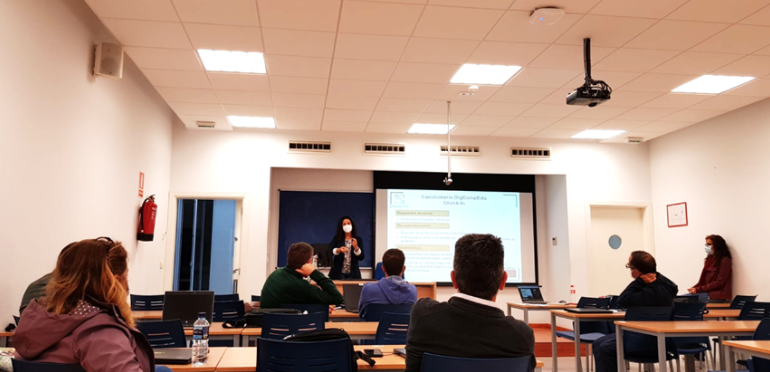Finished the first module of the Training Program for secondary education teachers of the DIg4LIfe project – Digital for Literacy and Future Education PROJECT (DIG4LIFE) Ref. 2020-1-IT02-KA201-079420. 22 December 2021
The first module of the Training Program for secondary education teachers of the Dig4Life project finished last December 13th. The Training Program, called Training for Teachers, is designed to provide interested teachers with advanced theoretical and practical training in the educational uses of digital technologies such as gamification and serious games, among others, and in their application for the creation of tools for self-assessment of the level of digital competence of their students.
The complete program lasts 80 hours and is structured in three modules:
- The first module has been developed during the month of November and the first half of December and consisted of a training course where participants have received theoretical/practical training on the different models of self-assessment of digital competencies, educational applications of different digital technologies and a method for the design of serious games oriented to the self-assessment of digital competencies of students. In this module, participants have had the opportunity to perform self-assessment of their level of digital competence with DigCompEdu and PIAAC models, to know and use different tools and technologies from a practical point of view. Similarly, teachers have participated in the process of co-creation of the serious game of the Dig4Life project. For this, they have worked in teams designing the storyboard of the different scenes of the game episode aimed at evaluating the Digital Communication and Collaboration competence area of the DigComp model.
The following modules will be carried out in 2022 once the formative module for the co-design of the game has been carried out in each of the remaining members of the consortium and the serious game has been built. The second module will consist of the use of the game in the classroom by secondary school students and the measurement of the results of the experience in each of the countries that form the consortium. Finally, the third module will gather feedback from the experiences carried out in order to evaluate the results obtained and identify actions for improvement.
At the UCA, the first module of the training program has been developed in a hybrid way combining face-to-face sessions, held at the School of Engineering, with online activities carried out on the UCA’s virtual campus. Fifteen secondary school teachers from different public and private schools in the provinces of Cadiz and Seville participated.
The training has been given by UCA teachers who are part of the Dig4Life project and has provided training on the importance of digital skills in today’s society, the types of assessment and evaluation models of existing digital skills, serious games and gamification as educational tools, the use of serious games as tools for self-assessment, a methodology for designing serious games and the application of this methodology for the co-design of the serious game that will be created collaboratively in the project. The attendees had also the opportunity to experiment from a practical point of view with different digital tools that exemplify the concepts studied.


